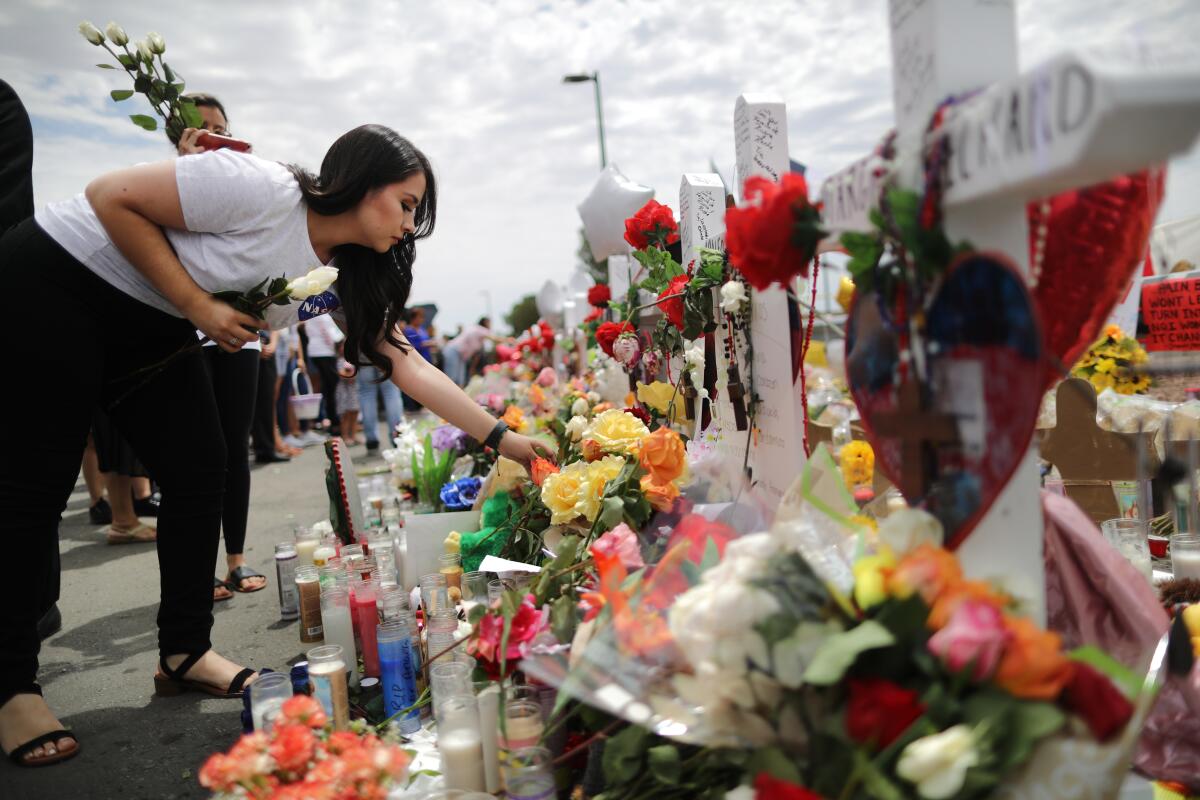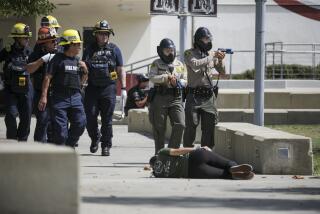After mass shootings, California sets new limits on gun buyers and expands firearm seizure

- Share via
SACRAMENTO — After a string of mass shootings across the country this year, Gov. Gavin Newsom on Friday toughened California’s already strict gun control laws, signing a raft of bills that broadly expand the state’s “red flag” law and limit the purchase of semiautomatic rifles by individuals to one per month.
Newsom, who was elected last year on a campaign that promised strict limits on firearms, signed 15 bills passed in response to recent mass shootings.
“This continues California’s leadership in terms of gun safety,” Newsom said at a state Capitol bill-signing ceremony.
“Gun violence is an epidemic in this country, one that’s been inflamed by the inaction of politicians in Washington,” Newsom added.
The measure restricting purchases, Senate Bill 61, prohibits Californians from buying more than one semiautomatic rifle per month and is one of two gun bills by state Sen. Anthony Portantino (D–La Cañada Flintridge). It also bans the sale of semiautomatic centerfire rifles to people younger than 21, removing a provision of the law that allowed younger people to buy such guns if they have a hunting license.
“Our efforts to keep high-capacity weapons out of the hands of teenagers, continuing to close loopholes in law, and working with the DOJ and governor’s office this past year on this slate of bills is important and appropriate work that will continue to make our communities safer,” Portantino said Friday.
The restrictions on gun buying were opposed by groups representing gun owners, including the National Rifle Assn. and its state affiliate, the California Rifle and Pistol Assn.
“This bill places burdens on law-abiding residents,” said Amy Hunter, a spokeswoman for the NRA, about SB 61. “It will not make anyone safer.”
Another Portantino measure signed by Newsom reduces the number of firearms an unlicensed individual is able to sell each year and the frequency with which they are able to sell.
“It is my hope that these bills can prevent a future horrendous violent situation,” Portantino said.
Newsom’s action comes just days after a new poll found that 68% of Californians say laws covering the sale of guns should be stricter. The poll, released Oct. 2 by the nonpartisan Public Policy Institute of California, found that 38% of state residents said they are very concerned about the threat of a mass shooting in their area, up from 28% who had the same fear in a PPIC poll two years ago.
Republican legislators opposed the one-gun-a-month bill and criticized the state for failing to remove guns from the hands of thousands of felons and people judged by the court to be severely mentally ill as it is already empowered to do.
“Instead we continue to do more and more legislation that interferes with the law-abiding citizen’s right to own and possess firearms, which is their constitutional right to do,” said Assemblyman James Gallagher (R-Yuba City).
The measure eliminating an exemption to the rifle-purchase ban for those under 21 who have hunting licenses was proposed after law enforcement discovered that the 19-year-old accused of opening fire at a synagogue in Poway had applied for a hunting license.
However, the license wasn’t valid at the time of the April shooting, which left one person dead and three injured.
A mass shooting that left 17 dead at a high school in Parkland, Fla., in 2018 was cited by lawmakers who approved legislation to expand “red flag” laws that allow people to petition the courts to remove guns from persons judged a danger to themselves or others.
The law currently allows law enforcement and family members of troubled individuals to ask the courts to issue a “gun-violence restraining order” that takes away their firearms, but the measure signed Friday by Newsom adds teachers, school administrators, employers and co-workers to the list of those who may petition the courts to remove guns.
Assemblyman Phil Ting (D-San Francisco) introduced the bill after school officials said they had raised concerns about the behavior of the Parkland shooting suspect before the rampage in February 2018.
“Thoughts and prayers are no longer enough,” Ting said Friday. “With school and workplace shootings on the rise, it’s common sense to give the people we see every day the power to intervene and prevent tragedies.”
Most of the laws signed by the governor take effect Jan. 1, but Ting’s bill expanding gun-violence restraining orders becomes effective Sept. 1, 2020. Then-Gov. Jerry Brown vetoed a similar measure last year, saying school employees and workers can work through family members or law enforcement if a restraining order is needed.
“I think law enforcement professionals and those closest to a family member are best situated to make these especially consequential decisions,” Brown wrote in his veto message.
Newsom said he was not familiar with his predecessor’s rationale but said that the expansion is justified and that other states and perhaps Congress will consider following California’s lead.
“What’s important is that this is another tool in the tool kit for those that know individuals the most,” Newsom told reporters. “There is a judicial process so there is due process.”
Newsom, who led the 2016 campaign that won voter approval of the gun control initiative Proposition 63, had signaled for months that he wanted to expand the state’s red-flag law.
Another measure signed by the governor extends the length of gun-violence restraining orders from one to five years.
Despite gun laws that are the strictest in the nation, California has seen its share of mass shootings, including one July 28 at the Gilroy Garlic Festival that left three people dead and 17 injured.
Within days of the Gilroy shooting, a gunman killed 22 people at a Walmart in El Paso and another man gunned down nine people outside a nightclub in Dayton, Ohio.
Newsom has reacted angrily to the carnage and demanded that Congress adopt national gun safety measures.
“I have no problem with the 2nd Amendment — you have a right to bear arms, but not weapons of goddamned mass destruction,” Newsom told reporters during a visit to the Santa Clara Valley Medical Center after the Gilroy shooting.
Portantino and Newsom criticized the U.S. Congress on Friday for failing to take action of its own on gun violence.
“I am very pleased that California continues to lead the nation on gun control but saddened that, despite tragedy after tragedy, Washington remains incapable of acting on a national level in the best interests of all our communities,” Portantino said.
Other bills signed Friday by Newsom will:
- Allow those subject to a gun-violence restraining order to submit a form to the court voluntarily relinquishing their firearm rights
- Require firearm packaging to contain a warning statement on suicide prevention
- Mandate that county sheriffs who issue licenses for concealed weapons charge a fee covering the cost of vetting the applicant, thus eliminating the current $100 cap on fees
- Prohibit gun shows at the Del Mar Fairgrounds in San Diego County
- Require, starting in 2024, that the sale of components used to build a firearm — often used to build untraceable “ghost guns” — be carried out through a licensed vendor.
More to Read
Sign up for Essential California
The most important California stories and recommendations in your inbox every morning.
You may occasionally receive promotional content from the Los Angeles Times.











